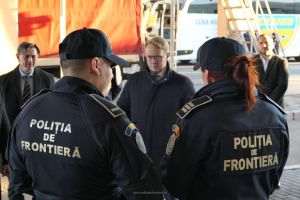Reporter: What is your opinion on the conflict between Israel and Hamas?
Dan Ben-Eliezer: During the previous conflict, of 2012, only a small part of the population in Israel was terrorized by missiles fired from the Gaza strip, as Hamas' attacks were being focused on the southern area. On the other hand, in the current conflict at the end of June not just the life of people in the other region became unbearable, because the thousand missiles flying towards Israel this time not only hit the southern area, but Tel-Aviv, Jerusalem and cities in the north as well.
I can say, however, that 40% of the population of Israel is under the constant threat of missiles. Starting with July 8th, (the date when the operation "Protection Edge" began), Hamas and its acolytes have fired over 2,293 missiles on Israel, an average of 140 a day. It is unbearable and it is Israel's right to defend itself, just like it is the right of any country to protect the security of its citizens. Thus, we have begun the military operation in Gaza, after all our efforts to appease the conflict have failed. I've made this step to stop the firing of missiles on Israel and to destroy the terrorist infrastructure of Hamas.
Israel has succeeded in developing a latest generation technology, the "Iron Dome" missile interception system, and this system has succeeded in preventing a multitude of air attacks, but in spite of all this, a significant number of missiles fell on Israel, on houses, schools of kindergartens. We have also invested in a system that would alert the population on time about a potential bombardment and we have developed a network of shelters. But the people have very little time to reach these shelters once the announcements come through the radio stations and when that kind of moments happen it is true pandemonium. The Israeli population suffers true emotional traumas. Imagine the children who have to run to shelters all the time. Fortunately, we did not have many victims, but what would have happened if we didn't have this technology? If Israel hadn't taken care of its own citizens through the warning system and "Iron Dome", the number of victims would have been very high.
But despite our efforts to stop the conflict, despite all those nightmare nights when we tried to protect our citizens, Hamas' attacks did not stop. That is why the government decided it was time for the second stage of the operation, namely the land offensive. An important thing about this second stage of the operation is that we have succeeded in uncovering, aside from the missile launchers, the threat of a large-scale terrorism directed at our citizens.
In the Gaza Strip, there are two types of people: those who live above ground (the "upper life") and those who live in underground tunnels ("the lower life"). There is a terrorist network of tunnels. These tunnels of terror start in the Gaza Strip and they arrive in Israel, for the moment just under the cities in the Gaza Strip or in their vicinity. Handcuffs and tranquilizing drugs were found, proving that the intention of the terrorists was to get into cities and villages and to take Israeli hostages.
I can tell you that so far, we have uncovered thirty-one such terrorist tunnels and we have destroyed nine of them, but this has only happened through the land operation. The average length of a tunnel is approximately 1.5 - 2 kilometers, and for such a construction approximately 500 tons of cement are needed, it takes over a year to complete it. They also need technology, so it is not that easy, because they need electricity and underground telecommunications. Instead of wasting cement on tunnels built for attacking Israel, Hamas could use it for building schools, kindergartens and other constructions for the benefit the population, including shelter. The terrorists aren't thinking of the welfare of the population in Gaza, but only how to reach their cynical goals. To show how absurd this situation is, the terrorists have even attacked Ashkelon, which is located 30 km South of Tel-Aviv, which supplies electricity to the Gaza Strip.
I have to mention that the terrorist actions of Hamas are war crimes against its own population. In spite of all our efforts to reduce the number casualties, they don't care about their own citizens and even more, they force them to stay in buildings which they know could be attacked. The militants of Hamas are only concerned with the development of their own terrorist infrastructure, but we care about the suffering of the civilians in Gaza and we do not want them to get hurt. Even prior to the beginning of the conflict, some of them would come to get treated in the hospitals in Israel. There are Palestinians who have had enough of Hamas and who blame the organization for what is happening to them. Just recently, the secretary general of the UN, Ban Ki-moon, made a statement that missiles were found in two schools in Gaza, and he said that this situation is outrageous and regrettable.
I would like to emphasize that during the operation we had a peace proposal drawn up by Egypt, which Israel accepted, but Hamas turned down. Everyone wants peace, including the Arab League and the Western countries, but Hamas continued its violent acts. There have even been two proposals of humanitarian ceasefires which Hamas also turned down. At this moment, there are new talks for a ceasefire, and there has been talk about a "break", which it seems Hamas will take under consideration.
Reporter: What do you think are the clauses of this conflict?
Dan Ben-Eliezer: The answer is very simple, and it can be found in the Charter of the Hamas, which seeks the destruction of Israel. I will quote a few fragments from this document: "Israel exists and will continue to exist until Islam destroys it, like it has destroyed others before. There is no solution to the problems of Palestine except for the Jihad (the Holy War). The prophet, Allah bless and save him, said: < The day of judgment will not come until the Muslims fight the Jews, (and kill them), until the Jews hide behind rocks and trees >".
If we want to find the roots of this conflict, we have to start from that document.
In 2005, Israel evacuated the Gaza Strip through a unilateral decision of prime-minister Ariel Sharon. It was a brave step at the time. At the time four towns in CisJordan were evacuated. The idea was to show the population living there that Israel truly wants to promote peace. But since then, the Gaza Strip has been dominated by terrorism, and starting in 2007, Hamas took over power by force from Fatah (ed. note: an acronym for the National Movement for the Liberation of Palestine). Now, Gaza is a base for terrorist acts against Israel. Hamas is a terrorist organization not just according to our definition, but also because it is on the list of terrorist organizations of the European Union, but it is considered as such by countries such as the United States of America, Canada, Japan. Even Egypt associates it with terrorist activities.
Israeli citizens have been and still are the targets of the terrorist attacks of Hamas. The last round of violence was in 2012 and at the time Egypt brokered a ceasefire arrangement, with the approval of the United States. Since then, the geo-political situation has changed. All this time, Hamas gained the necessary respite to strengthen its political position and in the long run, it aspires to control Cisjordan and the Palestinian institutions.
I would like to add the fact that "The quartet for the Middle East" (the UN, the US, the EU, Russia) asked Hamas to comply with three conditions, specifically to recognize Israel, to halt the aggressions against it and to comply with the old agreements that were signed between the Palestinian Authority and Israel. But Hamas won't accept those.
Reporter: Who finances Hamas?
Dan Ben-Eliezer: Concerning the financing of Hamas, I can tell you that their main sponsor, who provides them with weapons and finance is Iran. As you know, Hamas has two factions, the political and the military one. Over the last years, they have improved their offensive capabilities, the weaponry, the missiles, and this has happened with the help of Iran, regardless of whether it was through military training, or the technology provided, which has perfected their methods to build their own missiles. They have also run contraband with long range Iranian missiles. For example, in the previous round of violence, in 2012, ayatollah Ali Khamenei, Iran's spiritual leader, said weapons must be supplied to Cisjordan, just like in the case of the Gaza Strip, and asked for the destruction of Israel. Also, Ramadan Shallah, the secretary general of the Palestinian Islamic Jihad, has admitted that Iran has provided all of its assistance and support. Hamas also receives financing from Qatar and Turkey, where it also has branches. Each country has its reasons. I will not go into details and I will not comment on their foreign policies. Also, there are some very rich people who provide financial support to Hamas. Their goals may be good, but Hamas abuses those funds.
Reporter: The Iranian ambassador in Bucharest said that the Israeli attacks are war crimes against the Palestinian authority. How would you comment on that statement?
Dan Ben-Eliezer: I've already told you why Hamas is responsible for war crimes, because it uses the Palestinians as "human shields". Concerning the statement of my peer, I would suggest that you look closely to what Iran did, by proving weapons, and maybe they are the ones that should be accused of these war crimes against the Palestinians.
This is an asymmetric war, between a country and a terrorist organization, and the battle in the Gaza Strip is intended to fight a terrorist organization. That kind of organizations disregard any kind of laws when it comes to war. First of all, in the case of such conflicts, the involved parties must make sure that the military acts will affect the civilian population as little as possible. Second of all, a clear distinction must be made between the military targets and the civilians. But that's not how Hamas works.
The air attacks of our army concern directly certain terrorist targets, command centers of the terrorists, missile launch areas and terrorist infrastructures. And these attacks occur after the citizens of Gaza are warned by phone or SMS, that they have to leave those buildings because they are going to be bombed. Our desire is to attack only those spots where the attacks against our population are coming from. But, like I've said before, Hamas conducts its terrorist attacks from heavily populated areas and it does everything in its power to convince the civilians in Gaza not to leave the area.
Reporter: You said that the fight in Gaza is the fight of the state against a terrorist organization. Were you referring to Israel or to all the countries?
Dan Ben-Eliezer: This is definitely a problem that the world is currently facing, namely terrorism. Even though some countries are not concerned, one day radical Islam may be knocking on their door.
When talking about Hamas, they are just a small part of this big family of terrorism. In the Middle East, behind the radical Islamic organizations there are may others that are a lot more radical in their actions. Aside from Hamas, there are the Salafists and the Jihadists, the latter being sponsored by Al-Qaeda. The difference between Hamas and Al-Qaeda is very simple: the Hamas militants are radicals, but they do believe in the idea of country borders. On the other hand, the Jihadists do not believe in political borders and they believe that Hamas is a moderate political force. And I do believe that Hamas wants to prove that it is a radical movement.
Also, there is currently a major threat, that of foreign fighters in Europe. They are recruited, trained in Lybia and join the Jihadists in Syria, and they then return to Europe, thus exporting terrorism. It is a major threat, because these fighters go back with a series of new abilities and ideologies.
Reporter: What do you think are the solutions for peace in the Gaza Strip?
Dan Ben-Eliezer: I think that first of all, we need to demilitarize the Gaza Strip and to make sure that all the terrorist entities disappear. Also, the region should be monitored and controlled, and this mechanism should be well developed, to prevent Hamas from abusing a ceasefire to develop its capabilities for new mega-terrorist attacks. And in order to achieve this process, we need strong international partners. I do not rule out the idea of now being the right time for Abu Mazen, the president of the Palestinian Authority, to reinforce their presence in the Gaza Strip.
A permanent peace in the Gaza strip would be a very good thing, but I think we need to pursue a sustainable peace, which can be maintained without being abused.
Reporter: Thank you!































































1. fără titlu
(message sent by Carmela on 30.07.2014, 16:51)
Un interviu care ar trebui citit de toata lumea! Reflecta, prin date exacte, situatia din Israel. Poporul evreu, aflat sub amenintarea terorismului si miilor de rachete, doreste cu ardoare pacea. Chiar si o pace propusa de egipteni, pe care Hamas a refuzat-o. Cred ca este evident pentru cine este "viata" o valoare importanta. Domnule Ambasador, multumim pentru informarea atat de clara si detaliata!